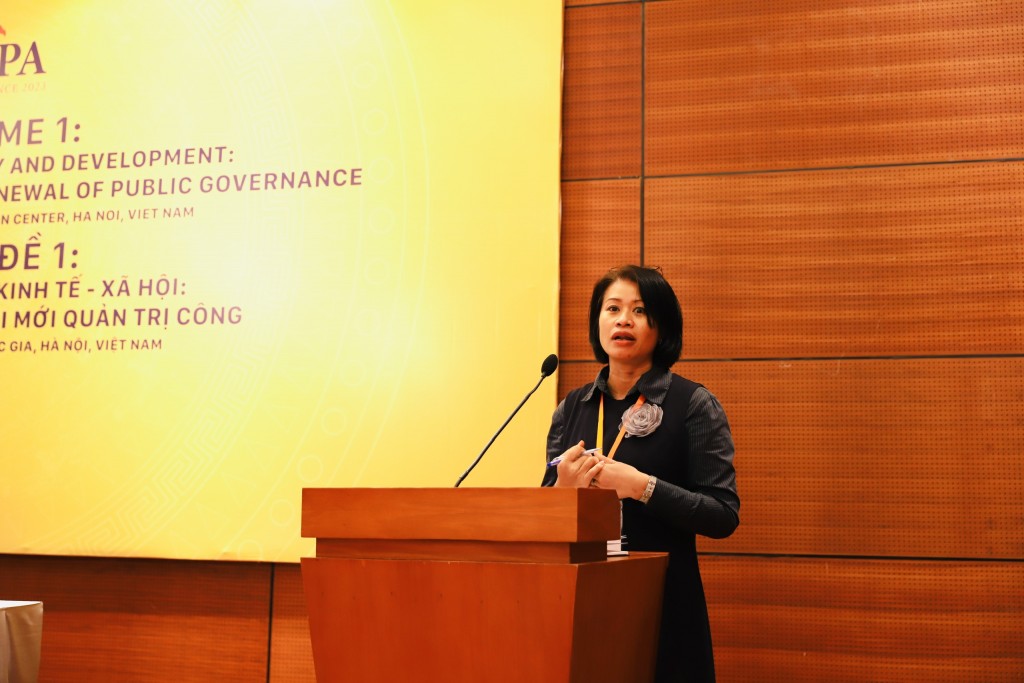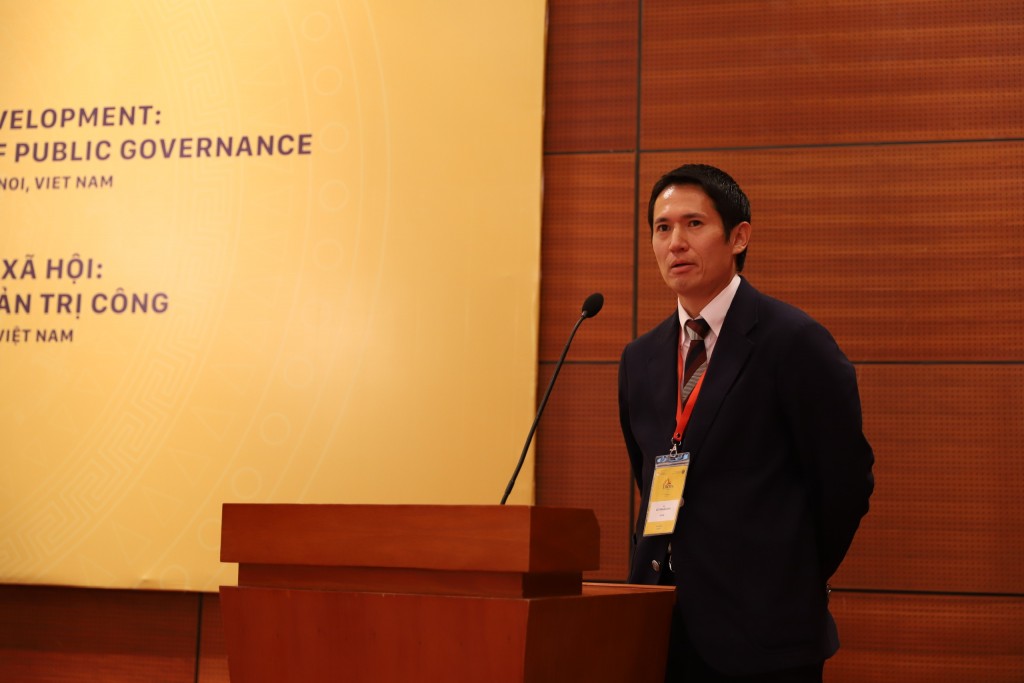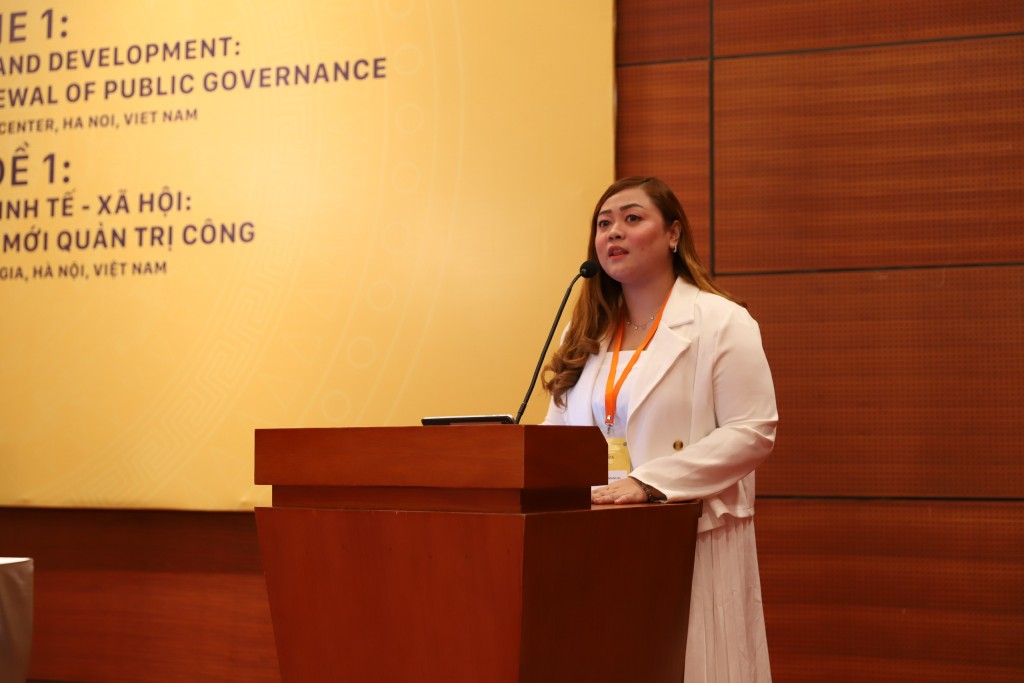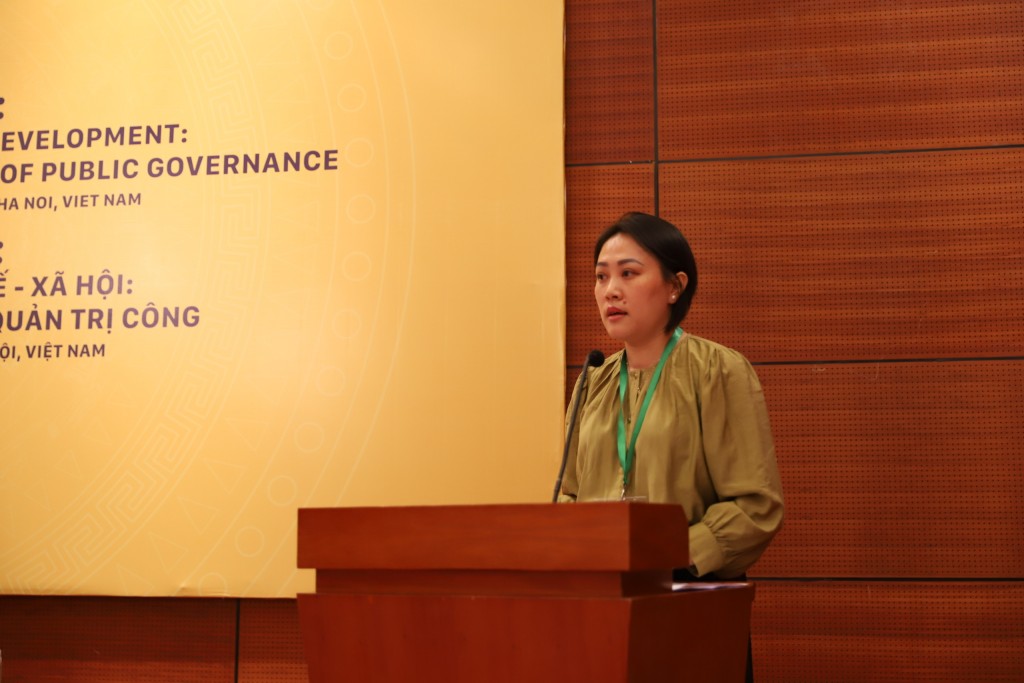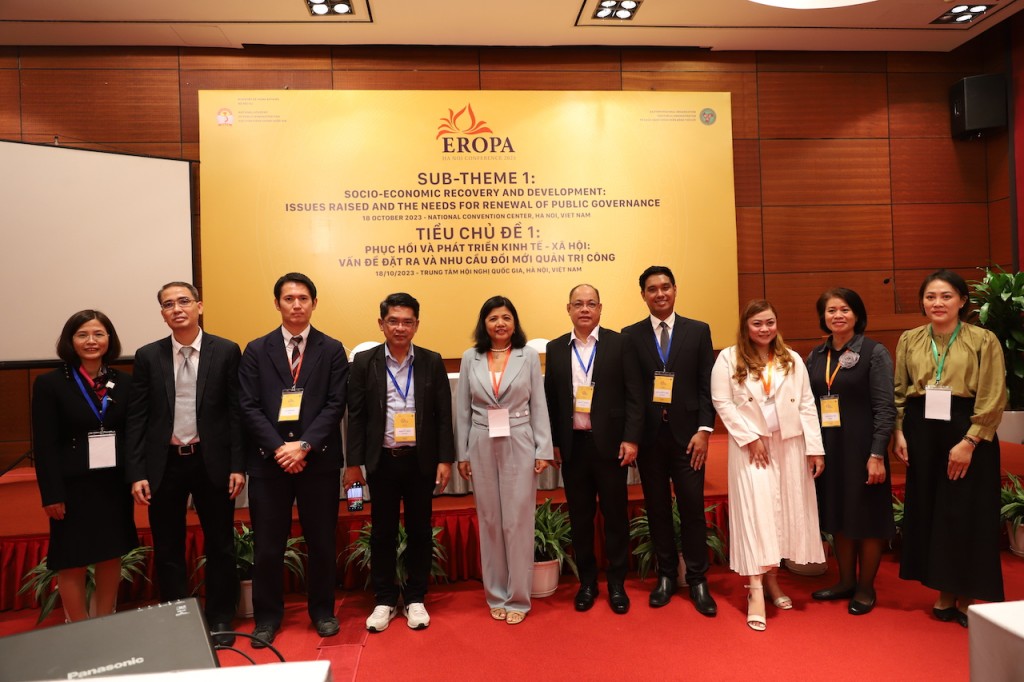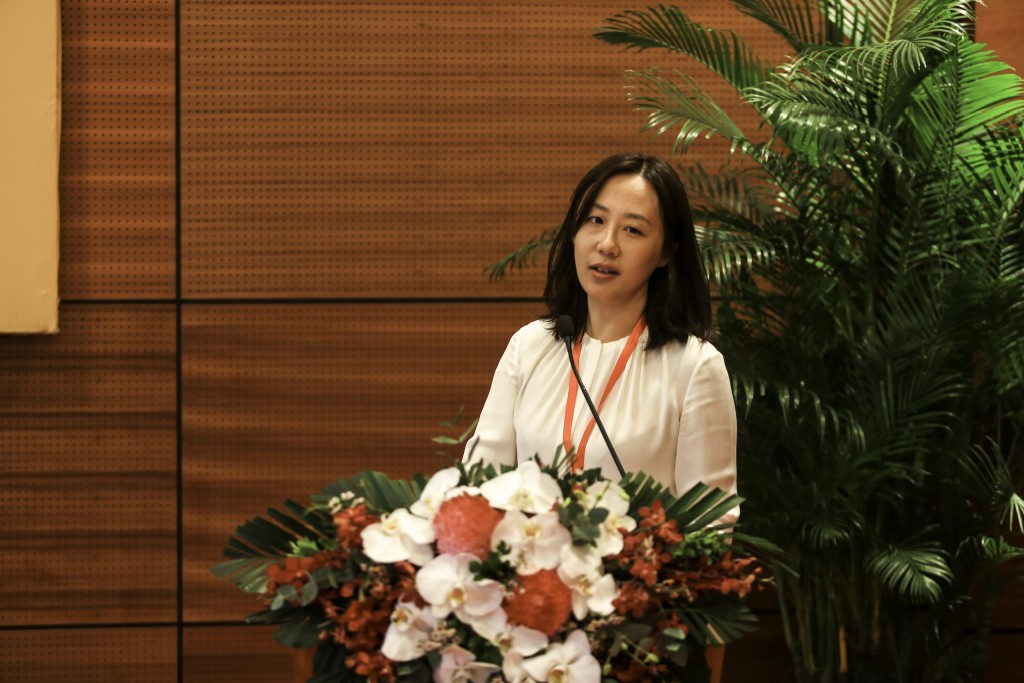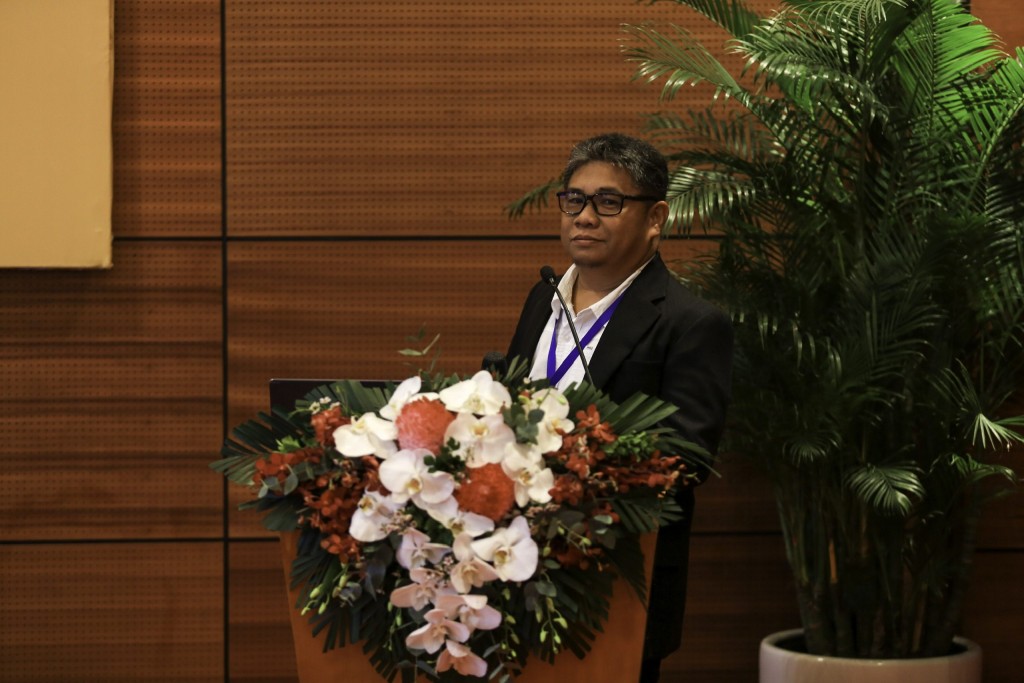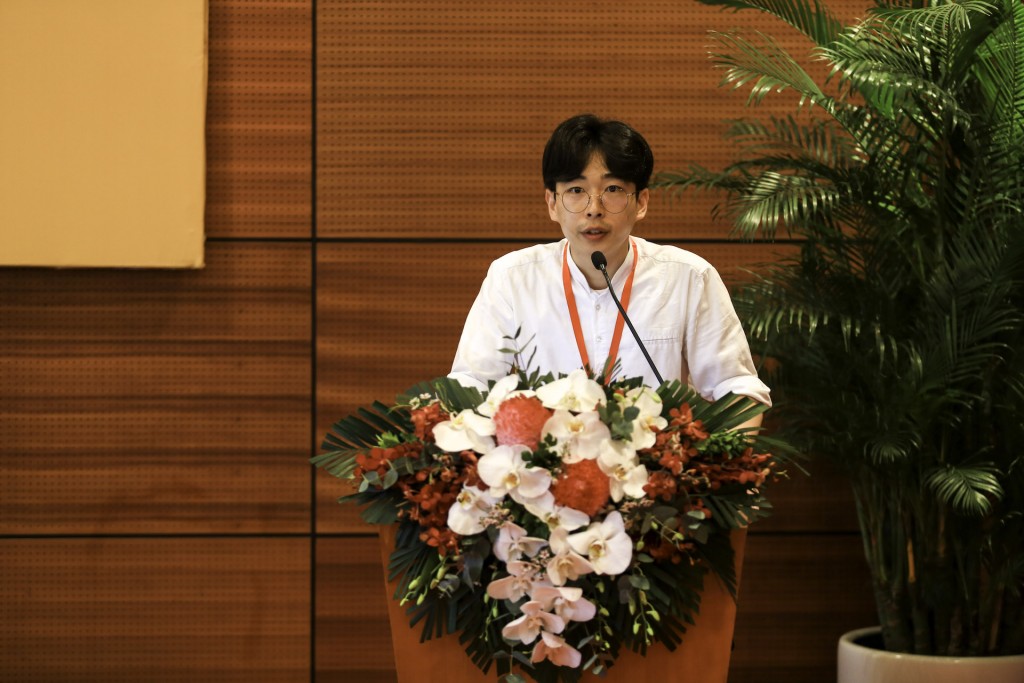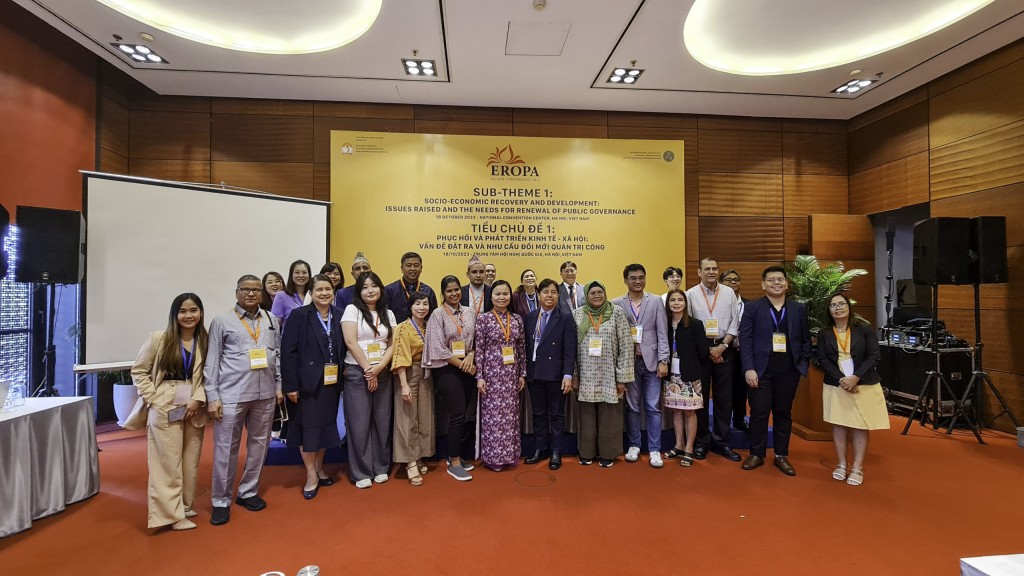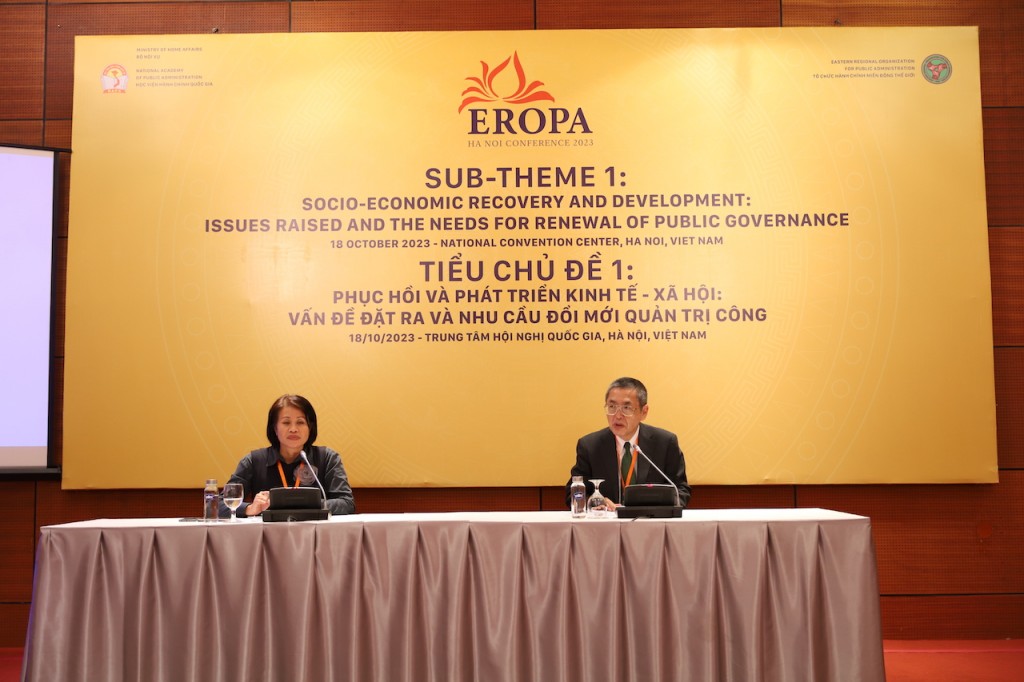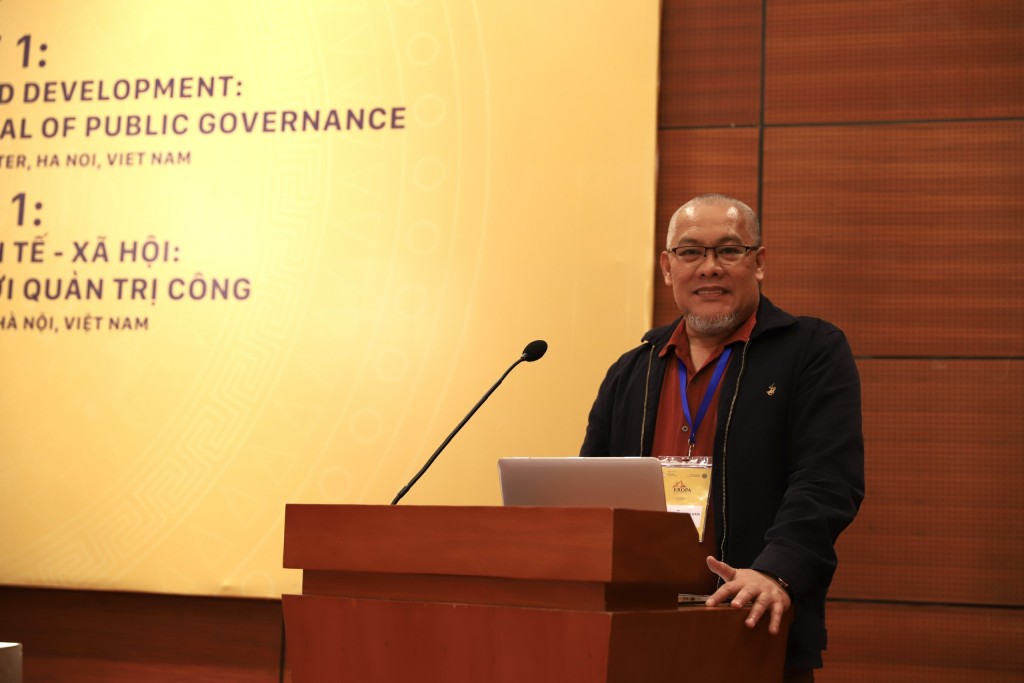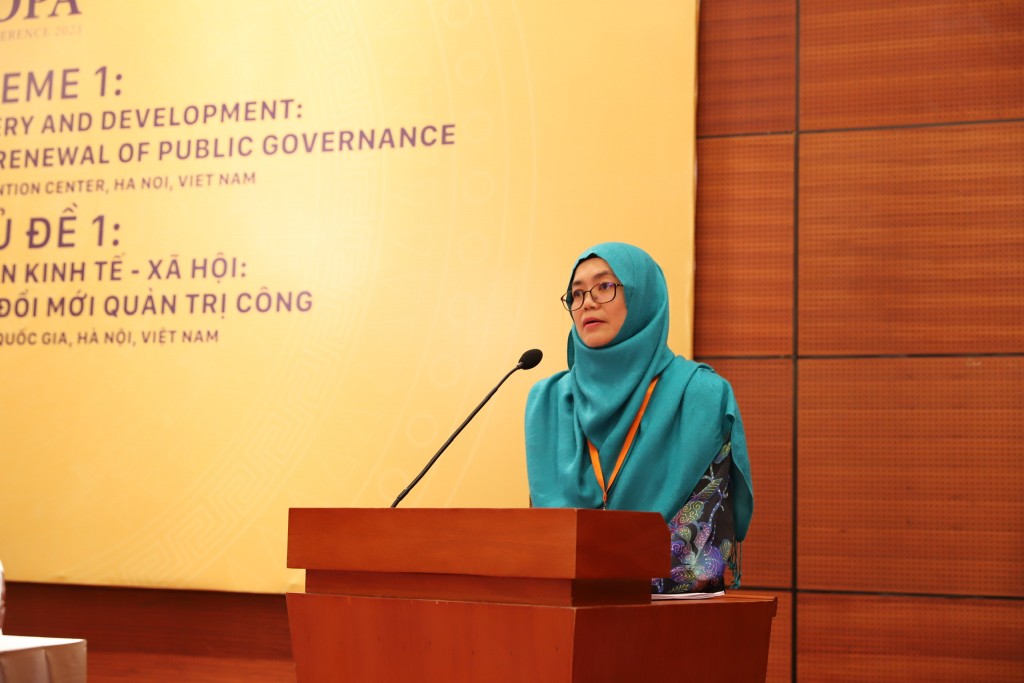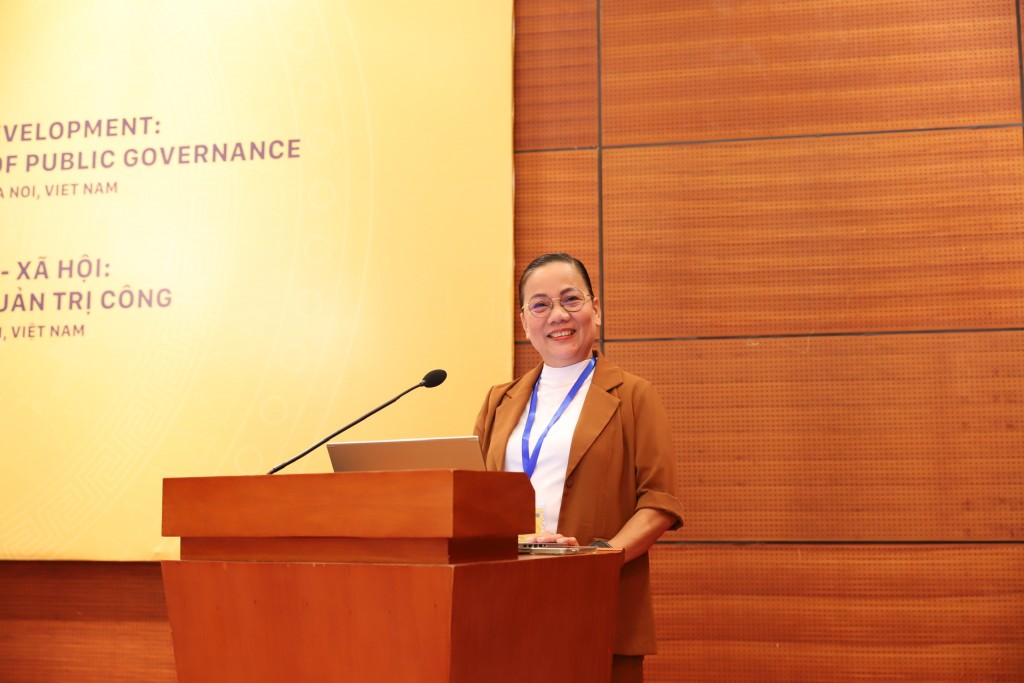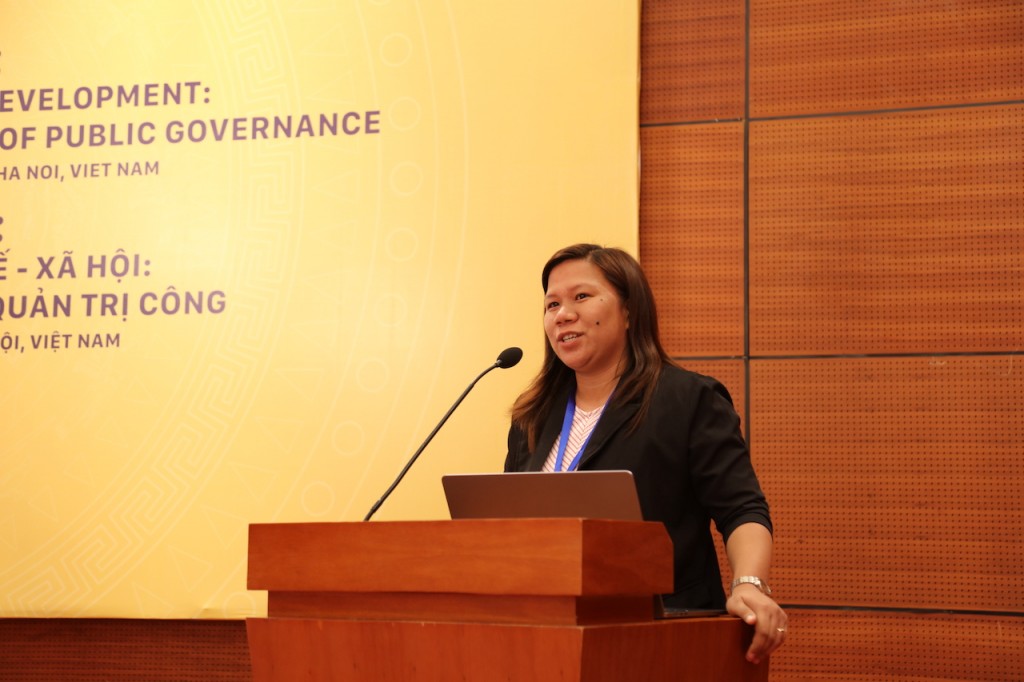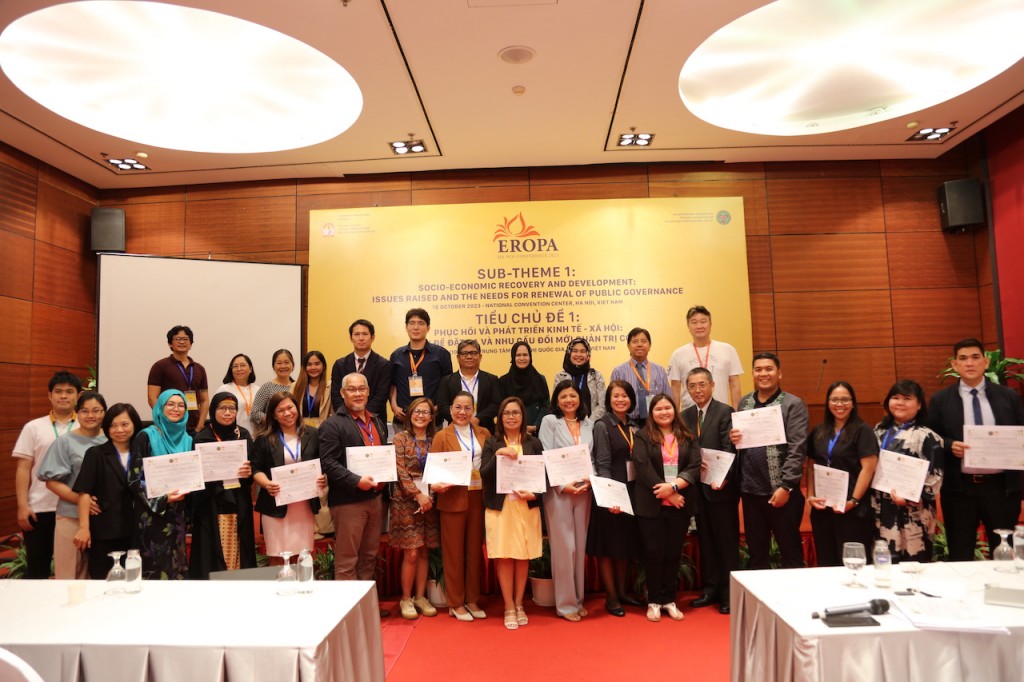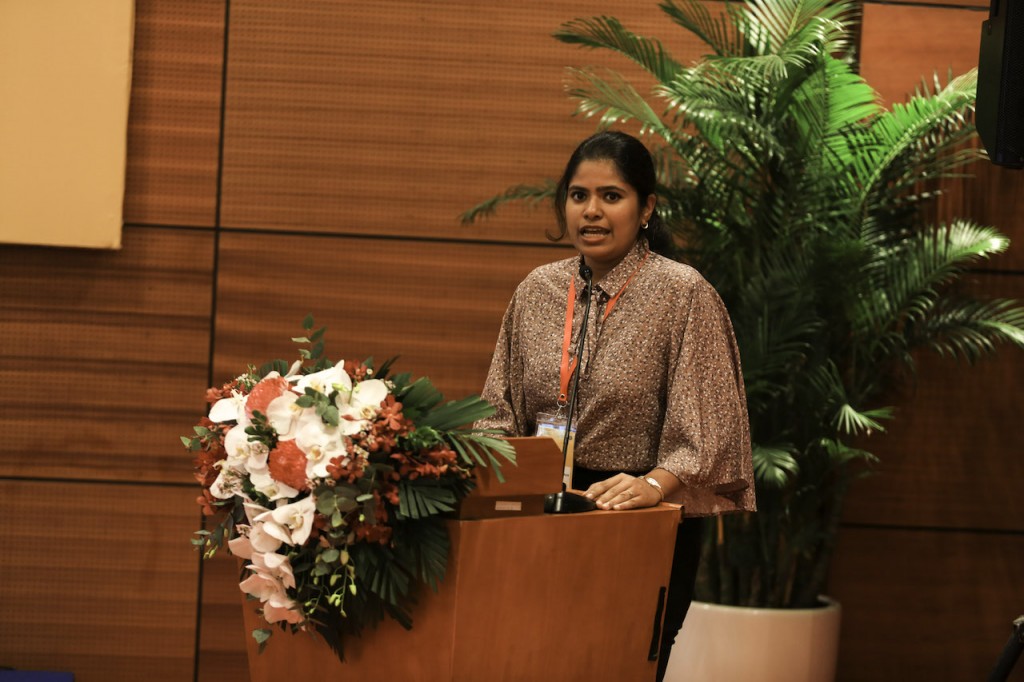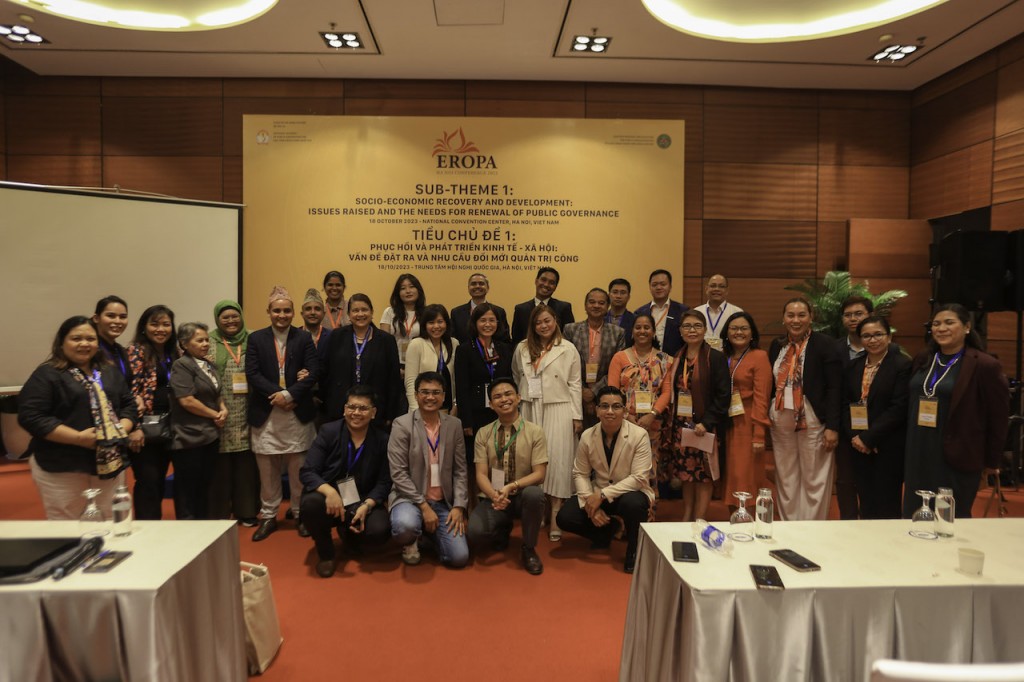On October 18, at the National Convention Center, Hanoi, three parallel sessions took place as part of the program of the 2023 EROPA Conference. Sub-theme 1 session titled ” Socio-economic recovery and development: issues raised and the need for renewal of public governance” has successfully engaged more than 40 presentations.
Morning session 1, Sub-theme 1, Venue 1
Prof. Juvy Lizette Gervacio, University of the Philippines Open University and Dr. Nguyen Thi Kim Chung, National Academy of Public Administration, moderated the morning session of sub-theme 1 in venue 1.
In her presentation on the topic of maintaining public human resources for resilience, Dr. Nguyen Trang Thu stated that the public sector of Viet Nam is coping with severe staff loss and low commitment, which affect its resilience after the Covid -19 Pandemic. Her paper highlights the role of mid-level managers and their communication in addressing this problem at the organizational level. It argues that when the leader applies a communication style that motivates participation, they can increase subordinates’ commitment to the organizations. Qualitative and quantitative data are gathered from public managers and employees for evidence. Based on the findings, suggestions are provided for public managers to improve their communication with employees with the view to retain the public service workforce.
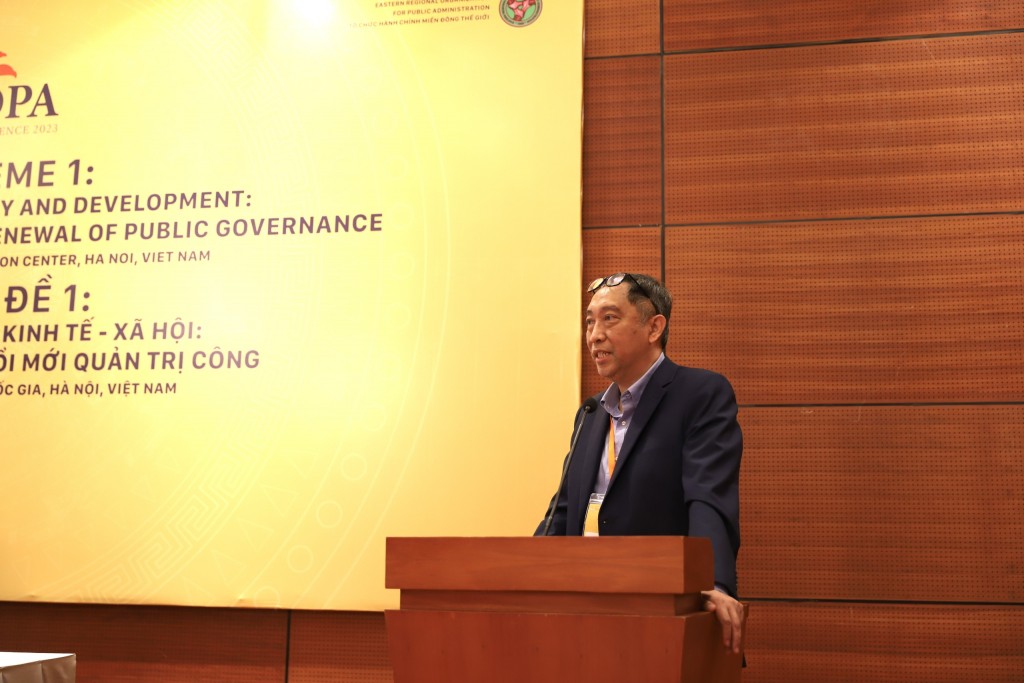
Dr. Eduardo Araral, Lee Kuan Yew School of Public Policy, National University of Singapore, presenting at the session.
Dr. Eduardo Araral, Lee Kuan Yew School of Public Policy, National University of Singapore, presented a paper titled “75 Years of Public Administration Review: An AI Synthesis of Trends in Topics, Methods, and Authorship”.
His paper uses correlated topic modeling (CTM), an advanced natural language processing and unsupervised machine learning model, to analyze and examine trends as well as variations and correlations in topics, methods and authorship over 75 years (1940s – 2016) using 8,140 articles and 140 million words. The paper concludes with the implications of CTM for advancing the theory, methods, and practice of public administration.
Dr. Nakagawa Go, Japan Municipal Research Center presented on the issue of political corruption. The main objective of the presentation is to discuss political corruption from two different perspectives. For many years, some economists have argued about the detrimental effect of political corruption on economic growth. However, in some political milieus, corruption may seem to have critical social lubricant functions. This is especially the case in Asia, where the gift-giving culture has become an integral part of their social lives. This presentation will argue that political corruption would have two different faces. It may generate a negative effect on economic expansion, whereas it will also become an important social lubricant and help developing nations produce rapid economic expansion.
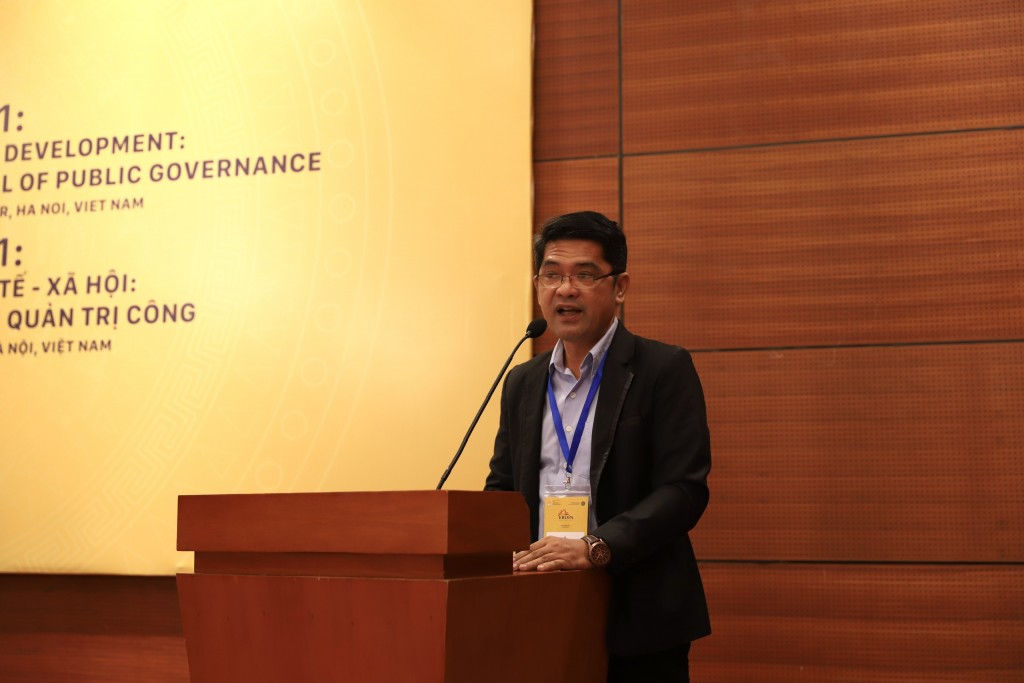
Dr. Harold Pareja, Ateneo de Davao University with his presentation “Public Economic Enterprises in the Local Governments: A Comparative Review”.
Dr. Harold Pareja, Ateneo de Davao University delivered his presentation “Public Economic Enterprises in the Local Governments: A Comparative Review”. According to him, public economic enterprises are aimed to spur economic development and improve the quality of service delivery. Currently, businesses tend to increase, but each country has adopted different models and even customized ones according to the country’s economic development situation. The lesson learned from those countries is that there is a need for a review of their public economic enterprises with an emphasis on the local government units. The paper will explore the public economic enterprises in the local governments of the selected industrial and developing countries. Specifically, it will answer the following questions: (1) What are the intentions and frameworks of the local economic enterprises (LEEs) adopted by these countries; and (2) What are the issues and challenges of LEEs in terms of administrative apparatus and sustainability?
Ms. Reiou Regie Manuel, City Government of Caloocan, Philippines, presented “Jeepney Phase (In): The Unaccountable Innovation and Ethical Dilemma of the PUJ Modernization Program”. The paper discusses how the Philippine Government practices ethics and accountability in the PUJ Modernization Program. Can the program provide answers and be responsible to the people, lawmakers, and implementing agencies regarding the ethics of the PUJ Modernization Program? In the Philippine transportation sector, the PUJ Modernization Program aims to provide environmentally sustainable transport and dignified livelihoods for the people while easing urban congestion across the country. However, as any other public innovation program, the PUJ Modernization Program has its perverse impacts that affect its direct stakeholders, leading to the question of whether stakeholders’ values were considered and whether ethics and accountability were performed by implementors.
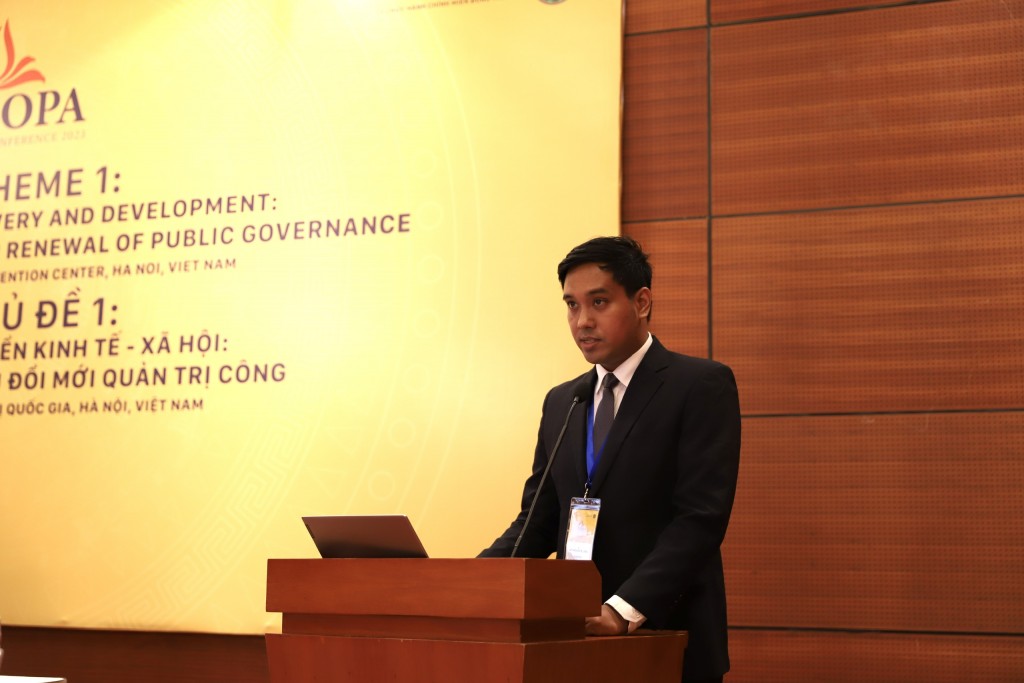
Dr. Paulito C. Nisperos, Don Mariano Marcos Memorial State University, Philippines with his presentation “Environmental Performance of Performance Challenge Fund Infrastructure Projects in the Province of La Union, Philippines”.
The Performance Challenge Fund (PCF) is a subsidy granted to Local Government Units that meet the Seal of Good Local Governance assessment criteria to fund high-impact projects. However, the construction process of these projects may pose risks to the environment through pollution and resource depletion. This study audited eight PCF infrastructure projects in the Province of La Union, Philippines, in 2019, using qualitative and quantitative approaches, including a validated questionnaire. The findings revealed that the PCF projects had moderately implemented environmental standards and practices. Hindrances in implementing environmental practices include the absence of facilities and mechanisms, strong attachment to old practices, and lack of concrete environmental policies and standards. Based on these findings, a validated Environmental Management and Sustainability Plan was developed. This study contributes to the improvement of environmental performance in PCF infrastructure projects and highlights the importance of sustainable development in the context of local governance.
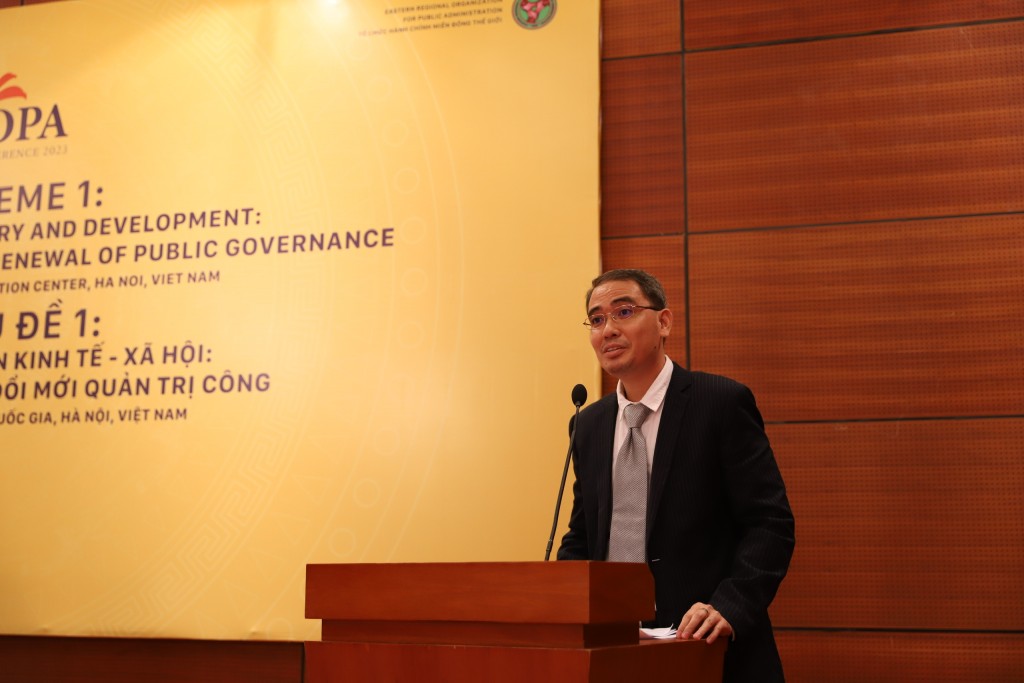
Dr. Gary Lapiz, Cebu Normal University, Philippines, with his presentation “Ethics and Accountability in Public Service: An Enlisted Governance Terminologies”.
Dr. Gary Lapiz, Cebu Normal University, Philippines presented his research titled “Ethics and Accountability in Public Service: An Enlisted Governance Terminologies”. This qualitative research “keywords” basic terminologies as enlisted from Philippine policies regarding ethics and accountability in public service for use in governance. The enlisted governance terminologies can serve as basis and/or guide in the design and formulation for both scholars and practitioners in public administration, especially in the day-to-day public affairs. Sorting out terminologies from policies all the more proves that public service and/or duty is good governance in ethics and accountability.
M.A. Do Hai Ha, National Academy of Public Administration, presented her research titled “Discussing public policies in restoring labor resources after the Covid-19 crisis towards sustainable development”. The presentation focuses on the issues raised and the need for renewal in public administration to facilitate socio-economic recovery and development, with the most important factor being human resources. This factor plays a decisive role in the process of restarting production and business after the Covid-19 pandemic. Therefore, restoring and developing the labor market is the top priority for organizations. According to Ms. Ha, minimizing the negative impacts of the Covid-19 pandemic on the labor force requires a collective effort from workers, organizations, and, especially, government support in formulating public policies.
Morning session 1, Sub-theme 1, Venue 4
Steering Committee Sub-topic 1 morning session (room 4): Dr. Alex Brillantes, Secretary General of EROPA and Associate Professor, PhD. Co-chaired by Nguyen Thi Thu Ha, National Academy of Public Administration.
Ms. Julie Espinosa and Dr. Rosalie Leal, Isabela State University, Philippines have research evaluating the condition of community-based Violence Against Women and Children (VAWC) desks at three levels: (1) the VAWC system (policies and regulations); (2) the entity (VAWC desk setup); (3) the individual (VAWC desk officers). Data were acquired through a survey of 33 VAWC desk officers using performance standards and assessment tools for services addressing VAWC in the Philippines. The findings indicated that rules creating barangay-level VAWC desks were not adequately enforced in San Mateo. At the same time, the research findings also revealed a lack of technology and resources to appropriately handle VAWC situations. Furthermore, VAWC desk officers’ educational background impedes their ability to carry out their obligations efficiently due to a lack of qualifications in the relevant subject matter.
According to Ms. Dai Yiming, Chinese Academy of Personnel Science, with the rapid development of economic and social reform, job crafting as the complement of the top-down job design is becoming more and more important in management research and practices. According to job crafting theory and regulatory focus theory, it is necessary to study the interaction effect between individual needs and leadership behavior on ambidextrous job crafting. Under high levels of transformational leadership, individual growth needs influence promotion-oriented job crafting and the interaction between promotion- and prevention-oriented job crafting more significantly.
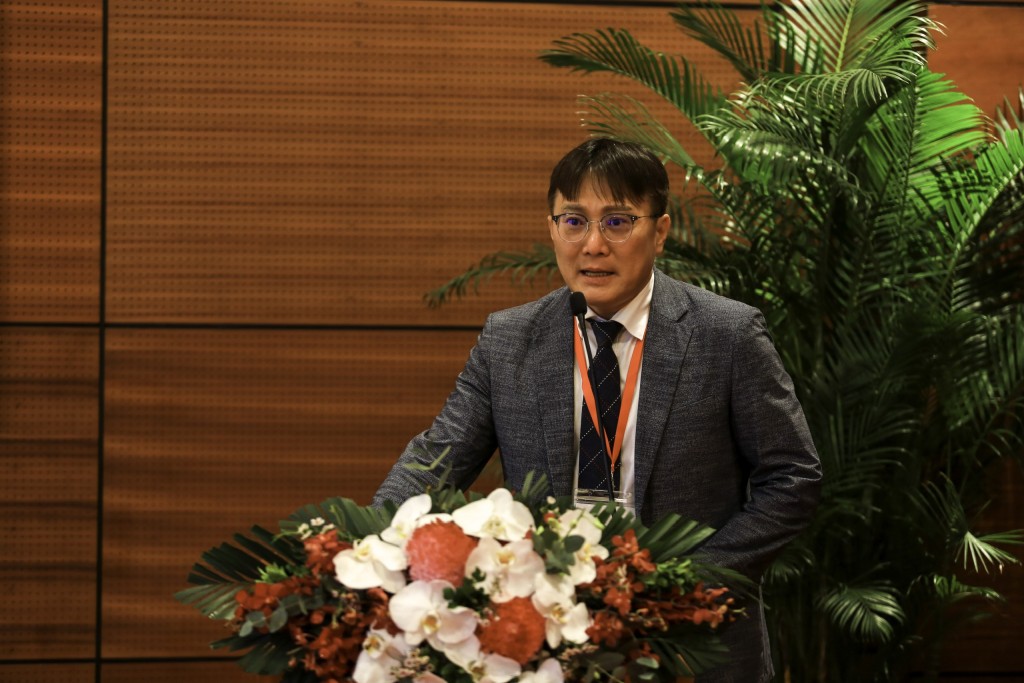
Assoc. Prof. Hyesong Ha, Graduate School of Public Policy, Nazarbayev University, Kazakhstan, presenting the paper.
Assoc. Prof. Hyesong Ha, Graduate School of Public Policy, Nazarbayev University, Kazakhstan, represented the group of speakers to present a study titled “Authoritarian and Democratic States: The COVID Pandemic and the Efficacy of Public Health Outcomes”. There is a populist narrative that authoritarian regimes were better able to respond to the challenges of the Covid pandemic because of their strict enforcement powers, compliance of citizens, and speed of autocratic decision-making in a crisis (particularly the recent Covid-19 pandemic). Research evidence to date on this assertion is, however, inconclusive or inconsistent. This paper analyzes data from democratic and authoritarian countries with the aim of finding out whether autocratic regimes, using greater stringency measures (policy interventions to tackle Covid), had better public health outcomes than their counterparts.
Representing the group of speakers from the National College of Public Administration and Governance, University of the Philippines Diliman, Mr. Marvin Jay Musngi presented the study “Reimagining the Futures of Disaster Risk Reduction Management Situation in for Sustainable Development in the Philippines”. AR/VR still needs to be fully integrated into the systems of Disaster Risk Reduction Management in the Philippine context. By garnering support and commitment from political leaders, the Philippines can pave the way for the successful integration of AR/VR technology, ultimately enhancing the country’s disaster prevention, preparedness, response, and recovery efforts.
Dr. Ahmed Safiqul Huque, McMaster University, focuses on analyzing the concept of public governance that has dominated the discourse on democracy and development since the turn of the twenty-first century. Both scholars and practitioners responded positively to the idea, and governments across the globe took the initiative to establish good governance. In developing countries, the bureaucracy is the key institution with the responsibility to establish and operate a system for accomplishing the goals of public governance. This leads to tension between democratic state institutions and the bureaucracy. The relationship between the state and bureaucracy has become increasingly complicated with new developments in the twenty-first century. Based on a review of the literature, the proposed paper will analyze the challenges encountered by both the state and the bureaucracy to identify tools and strategies to align the roles of the two stakeholders for enhancing the capacity to perform their respective roles.
According to Dr. Eduardo Lluz Ocaña Jr., University of Eastern Philippines, Northern Samar has basically an agricultural economy with more than 349,800- hectares total land area with a high incidence of poverty in the region, dubbed as the ‘rice granary’ in Eastern Visayas. It is on this basis that HCAAP was conceptualized wherein the national government obtained a loan from Japan International Cooperation Agency (JICA) amounting to 5.2 billion yen or 3.4 billion in pesos, allocating 2.4 billion pesos alone to irrigate 4,550 hectares of agricultural lands. However, the implementation stopped in 2013 with the budget nearly exhausted and the project uncompleted. The study shows that it failed to deliver irrigation system to most of 4,550 hectares of service areas in 64 barangays. The study concludes that the rural development project is just a dream to the farmers of Northern Samar without the government’s implementation of a genuine agrarian reform.
Ms. Hamida Rosidanti Susilatun, STIA LAN Polytechnic, represented the group of speakers to present the role of the library and archives agency of Sleman Regency in supporting the recovery of post disaster communities’ socio-economic conditions through the ‘Genta Siaga’ program. Indonesia is a country that is vulnerable to natural disasters. One of the vulnerable areas from natural disasters is Sleman Regency, DIY Province. This natural disaster will have a major impact on the social and economic conditions of the local community, such as the loss of their lives, properties and valuable documents (family archives). According to researchers, good management of family archives by the community is one way that can be done to support the recovery of socio-economic conditions after natural disasters. DPK Sleman is a regional archival institution that has duties in giving guidance to archives management, especially family archives. The research method used is descriptive research with a qualitative approach. Data collection techniques are interviews, document reviews, and observation.
Mr. Donguk Kim, Sungkyunkwan University, South Korea, represented the group of speakers to present about post-disaster resilience, focusing on the forest fire. This study analyzes factors that influence resilience to wildfires and natural disasters and identifies areas with high and low disaster resilience. The study uses variables of administrative capacity and policy, economic conditions and human factors for socio-economic resilience. As a result of the analysis, all three competencies had an important effect on disaster resilience after a forest fire. Therefore, the policy implications are as follows: (1) it is necessary to establish a governance cooperation network such as adjacent local governments, private, and communities, not individual local governments; (2) through research on the prediction and prevention of forest fires, local residents, local government officials, and civil society need to be learned the manual in areas where forest fires occur frequently; (3) after a large-scale disaster, it is necessary to find ways to increase resilience through social capital factors.
Dr. Reginald G. Ugaddan, National College of Public Administration and Governance, University of the Philippines Diliman, represented the group of speakers to present the study “The Pandemic’s Test: E-Governance as a Pillar for Trust in Government”. He emphasized that in 2020, the world suffered due to the effects of the Covid-19 pandemic. This global pandemic made countries shift to online services and activities, including government transactions. The same year, citizens and organizations demanded a quick response concerning the drawbacks caused by the pandemic. The paper also inquiries about the impacts of e-government platforms on public trust and citizen satisfaction during the pandemic. The results revealed that only information and service qualities are significant in public trust.
Afternoon session 1, Sub-theme 1, Venue 1
Prof.Dr. Akio Kamiko, Ritsumeikan University, Japan and Dr. Nguyen Trang Thu, National Academy of Public Administration, moderated the afternoon session of sub-theme 1 in venue 1.
In the afternoon session, Dr. Hiroaki Inatsugu, Waseda University, delivered the presentation “Public Personnel Administration of the Local Governments in Japan: How the Central Government Control the Total Personnel Cost Nationwide?”. Compared with other OECD countries, Japan’s public sector has a very low number of civil servants and a low proportion of total personnel costs in total expenditure. After explaining this unique central-local relationship and comparing it with the results of an intensive survey of the UK, France, Germany, Spain and the USA, this paper discusses the central-local relationship regarding personnel and salaries and the future human resource management of local governments.
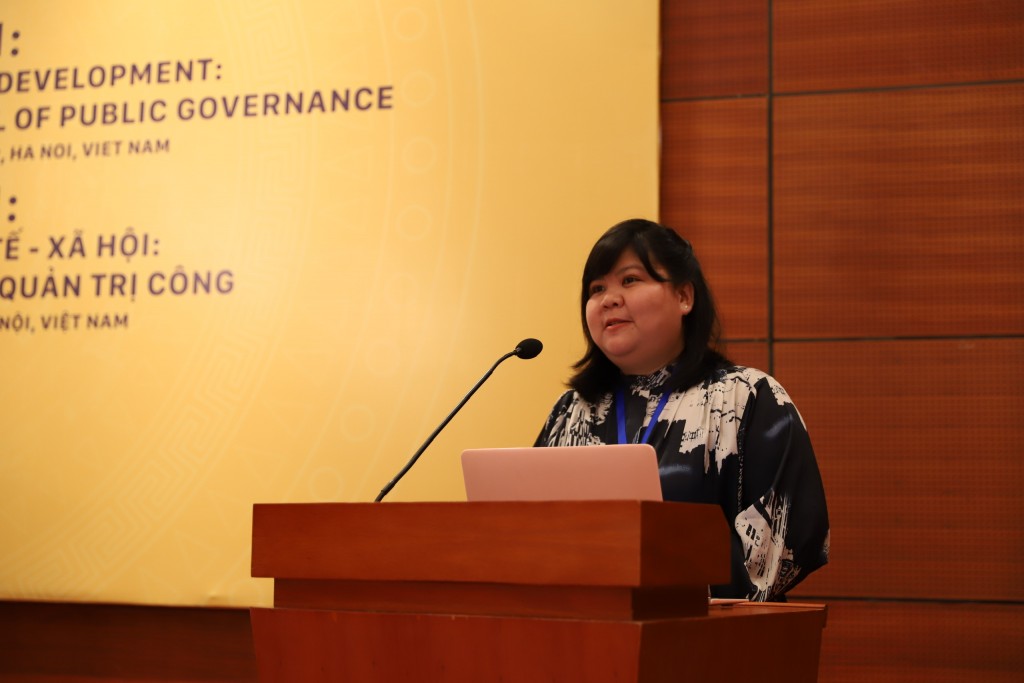
Prof. Kezzie Lyn Hilado, representative of the research team from the University of the Philippines Visayas, presenting at the session.
Prof. Kezzie Lyn Hilado, representative of the research team from the University of the Philippines Visayas, presents “Assessing the Support to the Barangay Development Program (SBPD) Implementation in Select Municipalities in Western Visayas, Philippines: A Fragment of the Philippines’ Whole-Of-Nation Approach towards Inclusive and Sustainable Peace”. The study aimed to describe the implementation of the Retooled Community Support Program (RCSP), highlighting the Support to the Barangay Development Program (SBDP) in three selected barangays in Iloilo Province. Recommendations provided were to strengthen inter-agency coordination, enhance the capacity of local governments, and review the policies on government appropriation and procurement.
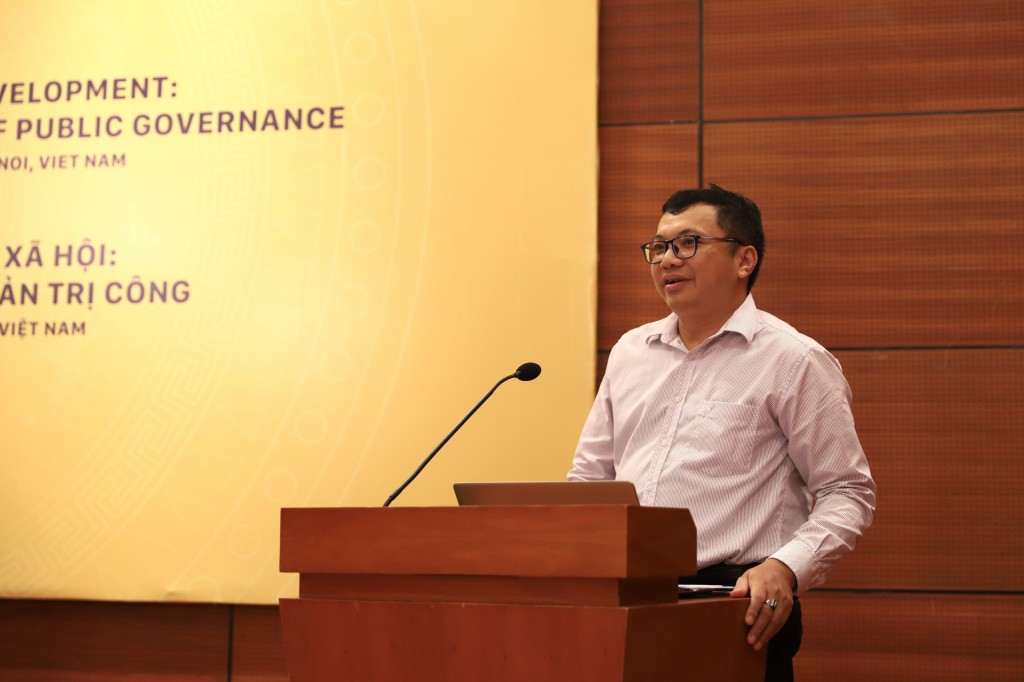
Assoc. Prof. Dr. Nguyen Nghi Thanh, National Academy of Public Administration, presenting at the session.
“Factors Affecting Corruption Control in Public Administration: Evidence from Vietnam” is the topic of discussion by Assoc. Prof. Dr. Nguyen Nghi Thanh, National Academy of Public Administration. This study aims to complement existing empirical evidence with quantitative research to provide a more comprehensive understanding of anti-corruption in Vietnam. The study examines the impact of five factors – institutional, cultural, political, economic, and personal – on individuals’ trust in controlling corruption in public administration in Vietnam. The results indicate that all five factors have a positive and significant influence on controlling corruption in public administration in Vietnam, with the Political factor having the most significant impact. The findings underscore the importance of institutional reforms that promote transparency, accountability, and good governance practices to instill public trust and confidence in the government’s ability to prevent and combat corruption within the country’s public administration system.
Dr. Saidamin Bagolong attended the session with the presentation “Role of Farm to Market Road in the Socio-Economic Recovery in the Post Covid-19 in the Province of Maguindanao, Bangsamoro Region”. Findings revealed that farm-to-market roads’ role in employment opportunities, transportation of people, goods and services, accessibility, and accountability to communities were moderately evident. However, regarding people empowerment, cohesiveness and resilient communities were highly evident. Hence, the farm-to-market road contributes considerably to the socio-economic recovery of communities post-COVID-19.
Dr. Ainonnacirin Abdulgani, Mindanao State University, Philippines discussed the employees’ mismatch in job satisfaction and performance among municipal links in the Ministry of Social Services and Development in the Bangsamoro region. The study showed no significant correlation between employee mismatch, job satisfaction, and job performance, and the null hypothesis is accepted. Thus, employees’ productivity is best observed through improved skills through education and training and additional benefits.
Dr. Putri Noorafedah Megat Tajudin, Malaysian Public Service Department, presented his study “Towards Sustainable Empowerment: A Guided Micro-Entrepreneurship Program for Unlocking Welfare Dependency in Malaysia”. The study explores the sustainable empowerment process among guided micro-entrepreneurs in a productive welfare program by addressing how sustainable empowerment occurs among guided micro-entrepreneurs. The findings reveal that sustainable empowerment is achieved through coping strategies, lifelong learning, and effective business management. To achieve it requires consistent efforts, good program governance, and full support from family and community.
Dr. Ma. Rita Reario, Isabela State University, Philippines, provided insight into the registration process, awareness levels, and challenges related to the Registry system for basic sectors in agriculture (RSBSA) in the province of Isabela, Philippines. This is a system built for farmers, farm workers/laborers, fisherfolk, and young agricultural workers. This research has very important implications for public administration and governance, especially in the current context of socio-economic recovery and development.
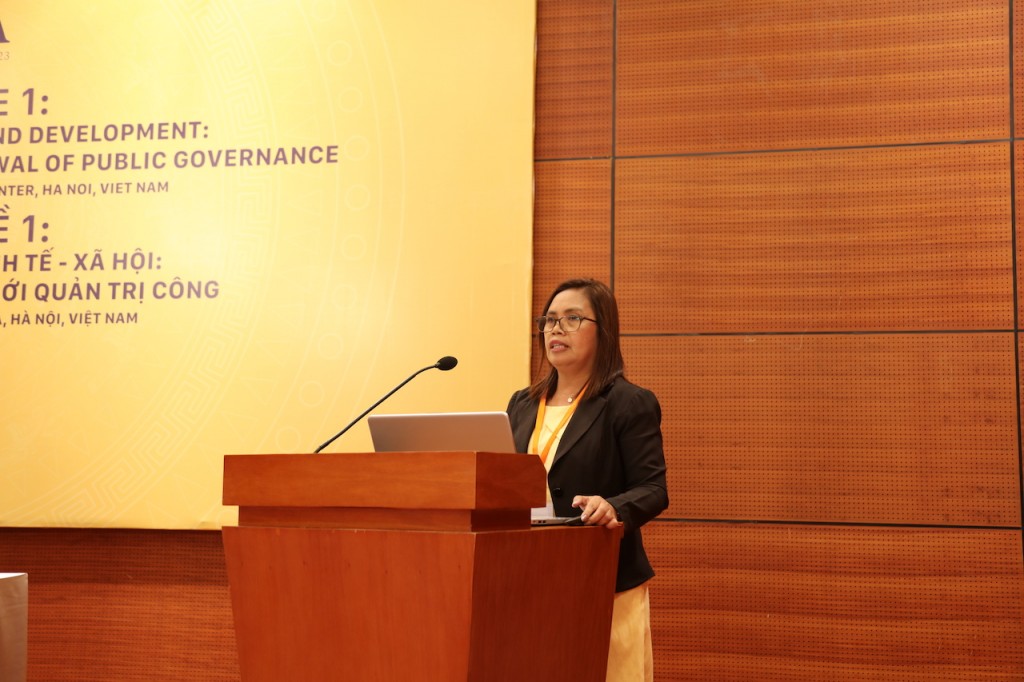
Dr. Rosalie Leal with a presentation assessing the implementation of basic services in San Mateo, Isabela province.
Also from Isabela State University, Philippines, Dr. Rosalie Leal presented research assessing the implementation of basic services in San Mateo, Isabela province. Recommendations are proposed in implementing public services, such as enhancing the sustainability of public services through meeting and addressing people’s needs; regarding the Department of Agriculture, promoting linkages and coordination with universities and organizations to address financial and technical support issues; seeking funding sources for basic services for the common benefit of the people and society.
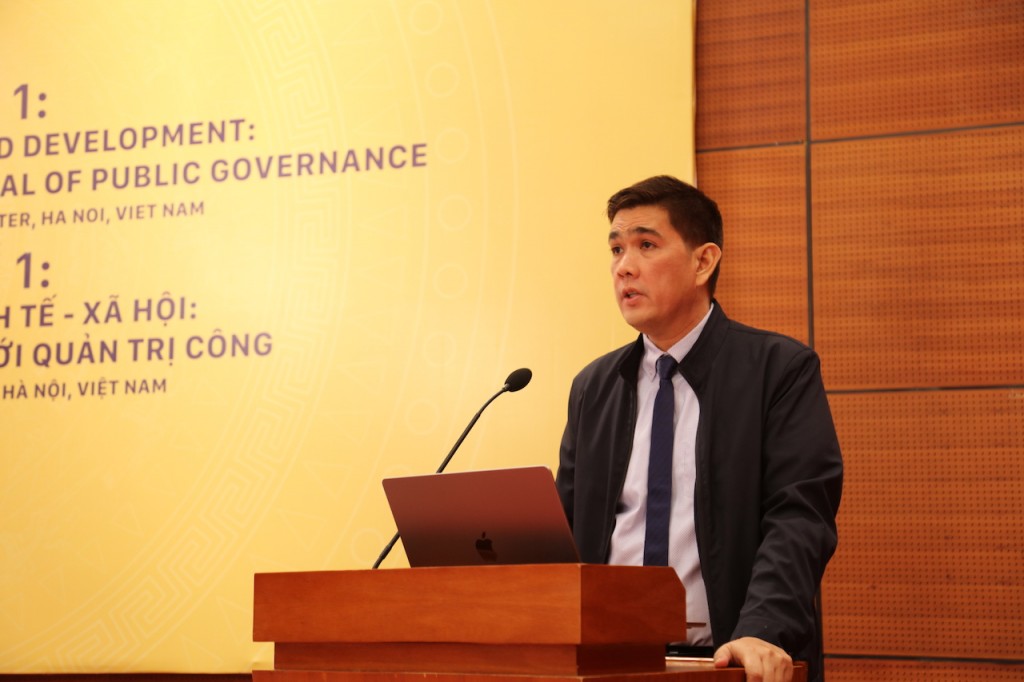
Dr. Edwin Caoleng, Tarlac State University, Philippines, presented factors that influence voters’ behavior and preferences in election.
Regarding the voting behavior and preferences of voters in Tarlac city, Dr. Edwin Caoleng, Tarlac State University, Philippines, presented the factors that influence voters’ behavior and preferences in choosing election candidates and the improvement of voting behavior and preferences of voters. Voters care what unique set of characteristics and propositions each election candidate must bring to the table. In some cases, young voters are even dissuaded from voting for traditional politicians and choose TV actors and personalities instead who have no experience or sufficient education.
Prof. Juvy Lizette Gervacio, University of the Philippines Open University, presented her research “Ensuring Food Security in the Philippines: An Initial Assessment of the Rice Tariffication Law”. According to her, in the Philippines, food refers to rice, which is a very important commodity, with an estimate of 100 million Filipinos known to consume rice; moreover, it is also a major source of income for farmers. On February 15, 2019, Republic Act 11203 or the Rice Tariffication Law (RTL), was signed into law, removing the quantitative restriction (QR) or the import ban on rice, thus allowing private traders to import rice as long as they pay tariffs (taxes) for the stock that they imported. This was also seen as an important step to secure the intermittent problem of rice supply in the country.
Assessing the competency of village officials in the Philippines, Dr. Patricia Ann Estrada, Tarlac State University, Philippines, sought to evaluate their competency along with facilitating planning, meeting facilitation, monitoring and evaluation, reporting, passing a resolution, and committee management. Capacity building requirements of village officials in the Philippines today are then identified.
Dr. Liza Joy Galanza, University of the Philippines Visayas, presented a study with the topic “Monitoring and Evaluation through Technology: The Development of Project Monitoring and Evaluation Applications for The Retooled Community Support Program Local Government Support Fund-Support to the Barangay Development Program (RCSP LGSF-SBDP) Projects in Panay Island, Philippines”. The monitoring and evaluation of these projects is essential in determining the effectiveness of the program towards the achievement of its goal of inclusive and sustainable peace. The offline operability of the developed M and E tool allows the same level of effective data collection and management in far-flung areas, even with the absence of the Internet.
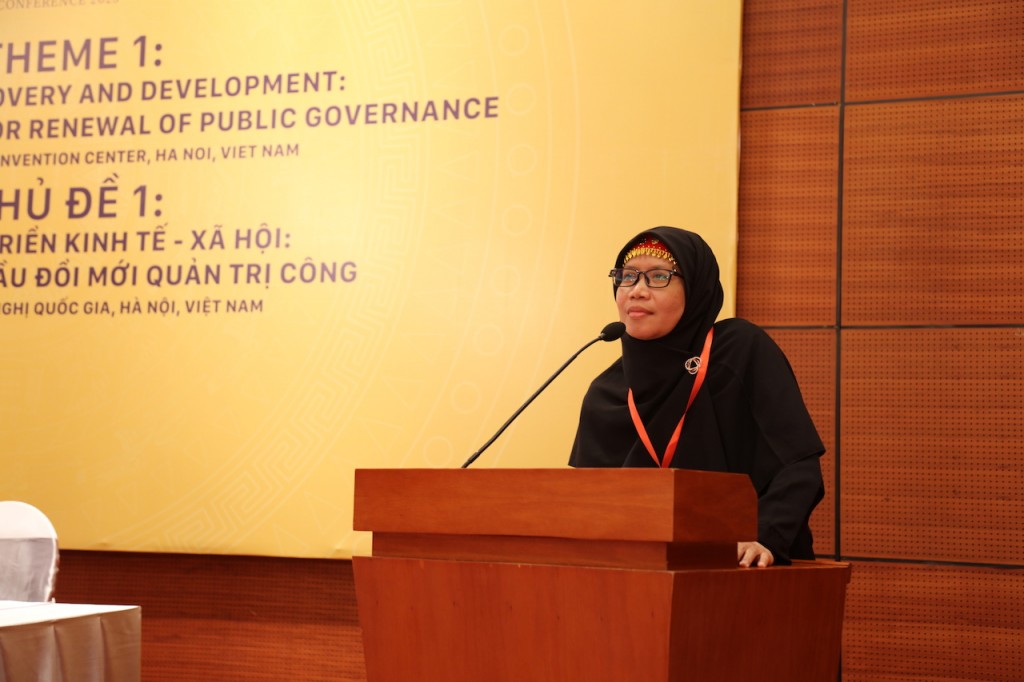
Ms. Ayurisya Dominata, Policy Analyst, National Research and Innovation Agency, University of Sains Malaysia, presenting at the session.
Ms. Ayurisya Dominata, Policy analyst at the National Research and Innovation Agency, University of Sains Malaysia, presented a paper titled “Development of HR and Management Capacities of Indonesian Educational Institutions to Achieve Top Ranking Universities and Promote Good Public Governance”. The results of the analysis found 7 strategies: (1) Habituation is not coercion; (2). Equitable education; (3) Maintaining academic reputation, reputation of entrepreneurs, and student quality in each faculty and department, improving international university research; (4) Opening access for international students; (5) Honesty and fairness for setting university work standards; (6) Removing the selection or graduation system based on proximity, nepotism, kinship network; (7) Building educational management that is open and global insighted.
Afternoon session 1, Sub-theme 1, Venue 4
Dr. Reginald Ugaddan, National College of Public Administration and Governance, University of the Philippines and Dr. Nguyen Thi Kim Chung, National Academy of Public Administration, moderated the afternoon session of sub-theme 1 in venue 4.
On behalf of his research team, Mr. Kent Elmann Cadalinfhid, emphasized that local government units (LGUs) are essential entities in climate action in the Climate Change Act of 2009. The paper examines the capacity and policy coherence of local governments in Metro Manila, Philippines, in mitigating climate change. In dealing with climate risks at the urban level, policy coherence is needed to achieve policy objectives. The approach, which integrates both quantitative and qualitative techniques, was applied to provide a holistic examination of the policy coherence of local climate mitigation actions in Metro Manila.
A group of speakers from Tribhuvan University, Nepal presented “Covid-19 and Health Sector Corruption in Nepal”. According to the report of Mr. Manish Pokhrel, the representative of the group, during pandemic situation, there was a rise in corruption worldwide, especially corruption in the healthcare system, both in developed and developing countries. The paper also describes how health sector corruption spanned from one form to the other and from one sector to the other, thereby paralyzing policymakers to grapple with the situation. In Nepal, corruption in the healthcare sector is widespread among healthcare service and material providers in the country.
Mr. Gino Rae Contreras, Don Mariano Marcos Memorial State University, Philippines, represented the group of speakers to present the study “Human Immunodeficiency Virus/Acquired Immune Deficiency Syndrome (HIV/AIDS) Knowledge, Attitude, and Sexual Behaviour of Youth in La Union”. According to him, awareness and behavior are two important factors in preventing the spread of HIV/AIDS. In La Union province, social media is the primary source of HIV/AIDS information, and there is a lack of information from official sources from local governments.
“COVID 19, Its Issues and Impact: The Role of Public Governance in the Socio-Economic Recovery of Bicol Region” is the topic of the presentation by Ms. Agnes P. Dycoco, Banco Santiago De Libon, Inc. The topic seeks to discuss causes and effects of the Covid-19 pandemic in the Bicol Region. The Bicol region is a group of contiguous provinces identified as such for administrative efficiency because the provinces have similar socio-economic and climatic landscapes; they should work together to cope with post-Covid-19 pandemic challenges.
Dr. Rosa Minhyo Cho and Mr. Keunho Jang from Sungkyunkwan University, South Korea gave a presentation on the effect of basic pension on the labor of the elderly. In Korea, the basic pension policy is a welfare policy that supports the income of the elderly. However, as Korean society entered an aging society from 2017, various concerns have been raised, such as an increase in the number of basic pension recipients, policy continuity, and financial burden. The biggest problem is that after the Covid-19 pandemic, the Korean government needs to focus resources on restoring the social economy.
“Need for an Interdisciplinary Approach in Public Sector Capacity Development for Socio-Economic Recovery and Development: Case of India’s Public Governance Structure” is the presentation of Dr. Iswarya Ramachandran, Indian Institute for Human Settlements. An interdisciplinary approach at the policymaking, planning and implementation stages is needed. It is necessary to institutionalize interdisciplinarity through training and capacity building approaches at the individual and organizational levels to enhance public governance capacity for socio-economic recovery.
Ms. Marian Frances Ysaac from Ateneo School of Government presented “Challenges in the Licensing of Primary Care Facilities in the Davao Region, Philippines”. Her research mentioned the challenges and barriers of the Region coming from limited information, poor political commitment, and limited financial resources that have hampered the licensing of primary care facilities, leading to a low number of licensed primary care facilities in the Davao Region, Philippines.
Also from the Ateneo School of Government is Dr. Jamie Eloise Agbayani, with the presentation “Analyzing the Impact of the Covid-19 Pandemic on Primary Health Care and the Service Delivery Network in Baguio City”. According to her study, delivery of essential health services was affected by lockdowns and diversion of healthcare to Covid-19; however, the pandemic also became the impetus for strengthening primary health care in Baguio City.
Mr. Basanta Raj Sigdel, Nepal Administrative Staff College, presented on “Practicing Leadership: Reflections of Nepali Civil Service”. The presentation aims to explore how Joint Secretaries of the Government of Nepal are utilizing their time and intelligence while performing their leadership role in their respective institutions.
“Strengthening and Empowering Public Institutions for Sustainable Development: Case Studies from Developing Countries” is the topic of Ms. Icha Choirunisa, representative of the speaker group from National Institute of Public Administration (NIPA), Indonesia. According to the group of speakers, in an increasingly VUCA environment, senior leaders in the Indonesian government public sector administration face significant challenges in delivering public service provision and building public governance involving various actors. The paper examines the impact of the National Leadership Training Program in Indonesia in cultivating innovation to promote public service provision for good public governance.



